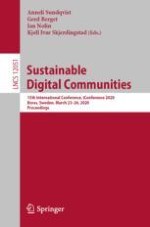2020 | OriginalPaper | Buchkapitel
Digital Natives and Digital Immigrants in the Creative Economy
How These Groups Adopt and Continually Use Digital Technologies
verfasst von : Shahrokh Nikou, Suellen Cavalheiro, Gunilla Widén
Erschienen in: Sustainable Digital Communities
Aktivieren Sie unsere intelligente Suche, um passende Fachinhalte oder Patente zu finden.
Wählen Sie Textabschnitte aus um mit Künstlicher Intelligenz passenden Patente zu finden. powered by
Markieren Sie Textabschnitte, um KI-gestützt weitere passende Inhalte zu finden. powered by
